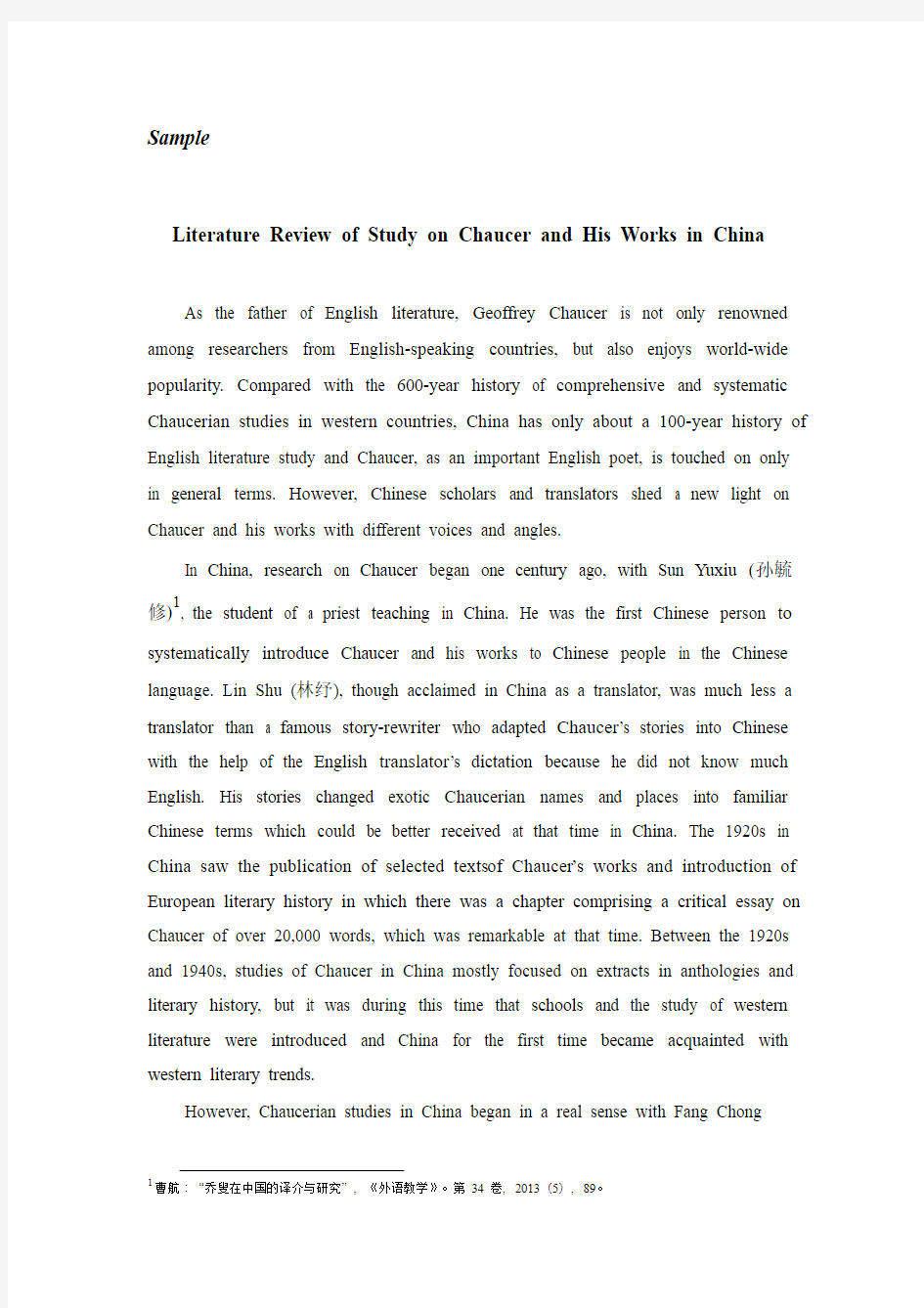sample-literature review.pdf


Sample
Literature Review of Study on Chaucer and His Works in China
As the father of English literature, Geoffrey Chaucer is not only renowned among researchers from English-speaking countries, but also enjoys world-wide popularity. Compared with the 600-year history of comprehensive and systematic Chaucerian studies in western countries, China has only about a 100-year history of English literature study and Chaucer, as an important English poet, is touched on only in general terms. However, Chinese scholars and translators shed a new light on Chaucer and his works with different voices and angles.
In China, research on Chaucer began one century ago, with Sun Yuxiu (孙毓 修)1, the student of a priest teaching in China. He was the first Chinese person to systematically introduce Chaucer and his works to Chinese people in the Chinese language. Lin Shu (林纾), though acclaimed in China as a translator, was much less a translator than a famous story-rewriter who adapted Chaucer ’s stories into Chinese with the help of the English translator ’s dictation because he did not know much English. His stories changed exotic Chaucerian names and places into familiar Chinese terms which could be better received at that time in China. The 1920s in China saw the publication of selected texts of Chaucer ’s works and introduction of European literary history in which there was a chapter comprising a critical essay on Chaucer of over 20,000 words, which was remarkable at that time. Between the 1920s and 1940s, studies of Chaucer in China mostly focused on extracts in anthologies and literary history, but it was during this time that schools and the study of western literature were introduced and China for the first time became acquainted with western literary trends. However, Chaucerian studies in China began in a real sense with Fang Chong
1曹航:“乔叟在中国的译介与研究”,《外语教学》。第 34 卷,2013(5),89。
(方重) (1902-1991). He was the first scholar to translate Chaucer’s works into prose based on faithful textual research and to systematically study Chaucer in the context of critical thinking in the western literary tradition. By combining Chaucer’s life experience and changes of his times, he drew a line separating Chaucer’s literary career2: before 1372, from 1372 to 1386, and after 1387. His translation of Chaucer’s works was compiled as Chaucer’s Collected Works . In 1957 Li Funing (李赋宁) published an essay on the use of adjectives in Chaucer’s works from historio-linguistic point of view. It was the first professional essay on Chaucer ever published in a Chinese academic journal. After the Cultural Revolution in the 1960s and the implementation of Chinese reform and opening up, the valve of western literature studies was opened and a much greater number of people began to take interest in Chaucer and old-and-medieval English studies. Bao Lvping (鲍屡平) wrote an essay on characters in the prologue of Canterbury Tales3, and compiled a collection of Chaucerian poetry studies. Li Funing in 1990s published a book about the history of English language which traced the evolution of English from Old English to Modern English. His student Liu Naiying(刘乃银)applied Bakhtin’s theory to Chaucerian studies and wrote an essay in 1999 entitled “Reading the Canterbury Tales: A Bakhtinian Approach4.” In the same ye ar Huang Gaoxin ( 黄杲炘) translated Chaucer’s Canterbury Tales in poetical forms. Since the new century more experts orient their work towards Chaucer and Old and Middle English studies. Chen Caiyu (陈才宇) published his stylistic form study on Old English and Old and Middle English. Shen Hong(沈弘), Wang Jihui(王继辉), Xiao Minghan(肖明翰), Cao Hang(曹航), Yang Kaifan (杨开泛), Li An(李安), Jiang Zejiu(江择玖), He Yueqiu(何岳球), Zhang Jinhong (张金红)are the new generation currently working on Chaucer and old and medieval studies from different focuses such as general literary research, translation, socio-historical background introduction, biographical and literary analysis, or having written doctoral dissertations on more specific topics such as characterization, structure, poetics, ideology, humanism, chivalry, courtly love,
2
李维屏曹航:“方重学术成就评述”,《外国语》。第35卷,2012(5),94。
3
鲍屡平:“论坎特伯雷故事集总引中的人物和人物描写”,《杭州大学学报(哲学社会科学版)》,1983(1)。
4
曹航:“乔叟在中国的译介与研究”,《外语教学》。第34卷,2013(5),91。
and dream vision.
Although many Chinese scholars are interested in medieval studies, there is as yet no special organization or academic journal to meet the demand of rising concern in this field5. The Medieval Research Center in Beijing University is still at the planning stage, although Shen Hong initiated it in 2005. Besides, Chinese higher language universities or institutions have not opened courses on old and medieval language and literature for English majors, graduate candidates of master’s or doctoral degrees, and postdoctoral researchers. Furthermore, research on Chaucer and medieval studies is inadequate either in inter-textual exploration or intra-textual analysis. Inter-textual exploration requires an inter-disciplinary foundation and source information which is rather scarce in China; intra-textual analysis demands good language proficiency in Old and Middle English, which is a challenge for second-language learners in China.
5 In contrast to this in China, Japan founded in 1984 a special research organization, the Japan Society for Medieval
English Studies (中世英语英文学会) and later started an academic journal, Studies in Medieval English and Literature (中世纪英语语言文学研究) ; South Korea founded in 1991 the Medieval and Early Modern English Studies Association of Korea (中世纪和早期现代英文学会) and published academic journal Medieval English Studies (中世纪英语研究)which was later renamed Medieval and Early Modern English Studies (中世纪与早期现代英文研究). Since 1999 South Korea has annually attended International Congress on Medieval Studies held in University of Western Michigan and International Medieval Congress in University of Leeds.(杨
开泛,“国内古英语文学研究综述”,《世界文学评论》,2011(1):298)
